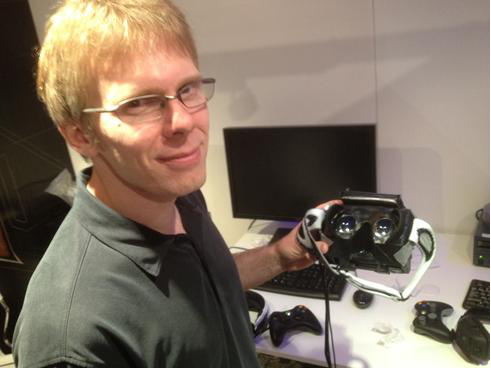Consumer Oculus Rift May be Powered by Android
He talks about head-mounted displays with Android and their own SoC.
In a recent video interview with Engadget, Oculus VR Chief Technology Officer John Carmack indicated that the consumer model shipping next year may be based on Android and pack a system-on-chip. He also revealed that a new dev kit is in the works and will ship out to developers before the commercial product arrives. How that commercial product will ship is still up for debate within the company.
Carmack made an important point about VR, but started with a brief discussion about how touch is important; it's how we interact with the environment. But glancing at things is the most intuitive way we gather information from the world. Thus, right now it doesn't matter how many GPUs we throw into a machine, or how many TFLOPs a console can perform to produce amazing, life-like visuals -- we're still viewing this virtual world through a fixed window.
"You could give us unlimited graphics power, letting us render modern movies real-time on the desktop in the games, and they would still be similar games," he said. "They would look great, you can do a few things we don't do right now, they would be better than what we're doing, but not really that different. When you're inside things, it really does change the equation. You are feeling something different. You're experiencing something different."
He pointed out that the original first-person shooters he helped develop were literally a 2D game that he made before, but thrown into a new perspective. All of a sudden it felt radically different, he said. The virtual reality experience can be the same thing, meaning formulas that were wearing thin in the current FPS genre could suddenly become fresh and new all over again in a world where you can glance over your shoulder. Indeed, on a personal note, it's weird looking at Epic citadel on Android or iOS now that I've had a chance to actually walk within the environment thanks to Oculus Rift.
"You will eventually have a head-mounted display that probably runs Android as a stand-alone system, that has a system-on-a-chip," he said when asked about Oculus Rift and mobile phone use. "So you're looking at something that's a tenth or less the power of your desktop PC, but for any given point along the GPU power spectrum, there are good games and experiences to be made there. Maybe that means you can only do Quake 3 or something inside there, but if you've got a micro port that lets you plug in a Thunderbolt or DisplayPort, and then run that from your super high-end desktop PC as an option, I think that's going to be the best of all worlds."
He goes on with the answer, as well as talk about the internal debate about how Oculus Rift will arrive to retail: will it be direct sale only, will the headset be sold in stores, or sold through partners in bundles with other hardware or software. The interview lasts for just over eight minutes, and can be viewed here.
Follow us @tomshardware, on Facebook and on Google+.
Get Tom's Hardware's best news and in-depth reviews, straight to your inbox.

Kevin Parrish has over a decade of experience as a writer, editor, and product tester. His work focused on computer hardware, networking equipment, smartphones, tablets, gaming consoles, and other internet-connected devices. His work has appeared in Tom's Hardware, Tom's Guide, Maximum PC, Digital Trends, Android Authority, How-To Geek, Lifewire, and others.
-
everygamer I like the idea of the Rift being able to run less-GPU intensive applications without the need for a laptop/desktop to power it, but I hope adding this does not make the retail product too complex. They really need to concentrate on the core technology, low latency, higher resolution as these are the most critical to the success of the product in the long term.Reply
